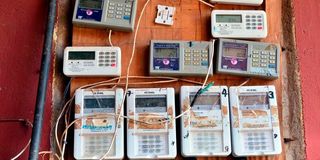Premium
Power bills dip slightly on lower fuel charge

A prepaid electricity token machine provided by Kenya Power at an apartment in Nairobi.
What you need to know:
- Kenya has since March recorded significant jumps in hydro-power generation, following heavy rains. Hydro is the cheapest source of power in the national energy mix, highlighting why increased production from the dams is key to lowering power bills.
- FCC and forex are the two biggest pass-through costs, which alongside the gazetted electricity tariffs, determine power bills that consumers pay monthly.
Electricity prices have dropped marginally, driven by a fall in fuel costs and forex adjustment charges, extending relief to homes and businesses.
The Energy and Petroleum Regulatory Authority (Epra) set the Fuel Cost Charge (FCC) at Sh3.55 from Sh3.57 last month, while the forex adjustment has been lowered to Sh0.83 from Sh1.1 last month.
The drop in FCC and forex charge has seen electricity prices fall slightly, with Sh500 now fetching 19.7 units compared to 19.5 units for the same amount last month.
This drop is timely to consumers who are coming from the spending spree of the festive season last month and the re-opening of schools, which have significantly hit their pockets.
“The net effect is that end-user tariffs will decrease by Sh0.27 kilowatt per hour plus 16 per cent VAT across all categories,” Epra says in a brief.
This extends from last month when prices dropped due to the fall in the FCC.
Falling fuel prices, reduced dependence on thermal plants, and a strengthening shilling are behind the drop in the two charges, which will extend the relief that consumers enjoyed last month.
Increased generation from the country’s dams, coupled with higher electricity imports from Ethiopia and Uganda, have been key to reducing reliance on thermal plants to shore up supply, especially during peak demand.
Kenya has since March recorded significant jumps in hydro-power generation, following heavy rains. Hydro is the cheapest source of power in the national energy mix, highlighting why increased production from the dams is key to lowering power bills.
FCC and forex are the two biggest pass-through costs, which alongside the gazetted electricity tariffs, determine power bills that consumers pay monthly.





